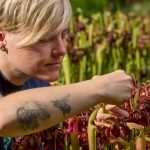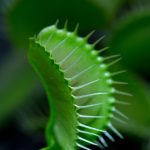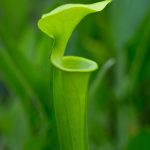The Great Outdoor Adventures of Jess Stephens

By: Cynthia Adams | Photos By: Nancy Evelyn
Scientist and UGA doctoral student Jessica Stephens left her hometown of Wheaton, Illinois behind in her rearview mirror when she headed to the South for graduate studies. She didn’t look back and embraced the South heat, humidity and all. For the truth was, the lush southern landscape appealed to Stephens so much that she was more than willing to ignore the muggy weather whenever the temperatures soared.
Little did Stephens know she would discover her future vocation–plant biology—and her favorite research topic—the idiosyncratic carnivorous plants in some of the muggiest places she would explore. Carnivorous plants, sufficiently strange to inspire films and plays, such as The Ruins, and Little Shop of Horrors, are known to be more abundantly concentrated in the Southeast than elsewhere in the nation.
Stephens was game for whatever Mother Nature had in store from the get-go. “I grew up in a suburb of Chicago. There was practically no nature. As you drive away from the city it’s just endless cornfields…I was blown away by how many trees there are here!”
And she is outdoors if not in the plant biology lab—often at work in the field studying carnivorous plants that absorb her professional hours—or else playing softball or hiking in the green mountains of northern Georgia.
Stephens plays second base for the Little Kings Bruisers and played softball competitively as a Division I athlete in college. She has fond memories of spending most of the summer outdoors on the softball field as a young adult and she admits she is happiest outdoors.
The great outdoors makes Stephens feel lighter, exhilarated.
‘I got into biology because I’m interested in the natural world…that’s where I recharge. I like to sit and enjoy nature every chance I get.”
However, she found a different type of inspiration right in her kitchen at home in Chicago.
“My Mom was very influential to me. I’m a first generation four-year college student,” Stephens explains. Her mother, Debra Zimmerman, returned to school to earn an associate’s degree when Stephens was in the seventh grade. This is something which Stephens discusses with the greatest of admiration: her mother worked multiple jobs having to rise early and study late into the evening. None of this was easy.
Stephens recalls nights spent at the kitchen table, with mother and daughter bent over their books after dinner. “We would study together,” she says, again smiling. Her mother’s deep commitment to finish an associate’s degree struck Stephens as admirable, worthy of emulation. “My mom is one of the hardest working people I know. She really showed me what hard work can achieve.” It suffused Stephens with a sense of pride and willingness to see things through.
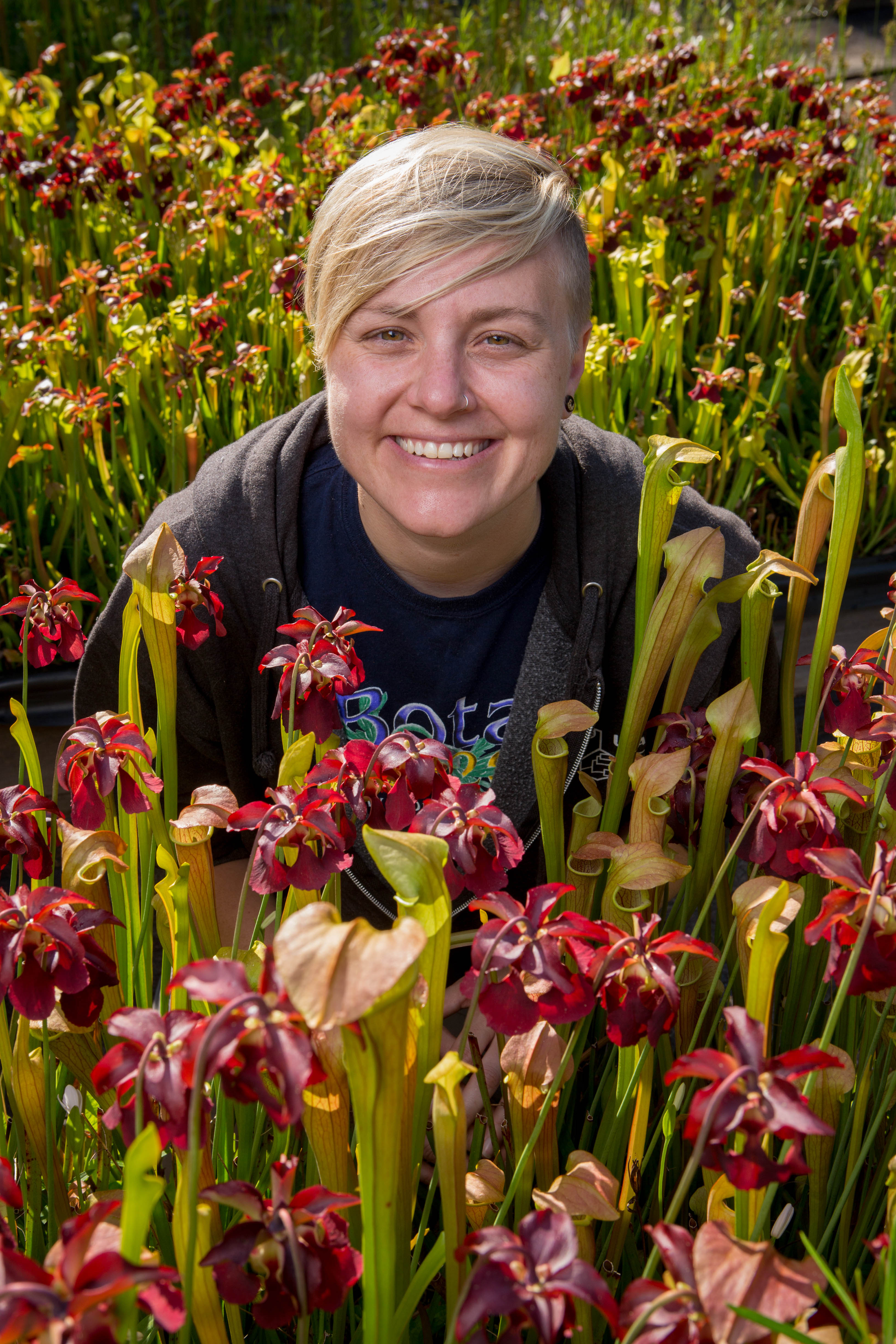
Both her mother and grandmother are also passionate about time spent outdoors. Their gardening is also a point of pride.
“My mom and granny are big gardeners and are always outside gardening. Often times when I was little I would come out and help. They really instilled in me a sense of connection with nature.” She also spent many summers at the YMCA outdoor camps exploring nature. The examples of such strong women modeled habits that have stayed with Stephens.
Stephens attended Butler University in Indianapolis, Indiana as an undergraduate. There she was exposed to urban ecology research, and she ultimately worked as a field technician in Arizona and Colorado and Illinois tracking various species (including the Mt. Graham red squirrel, the white-tailed prairie dog, and turtles) before entering graduate school at Auburn University.
At Auburn, she earned a master’s degree in biology. Her thesis research was “a combination of life history aspects and genetics of the pitcher plant moth across the southeastern United States Coastal Plain.” Stephens quickly came to love the biodiversity of the Southeast and felt she had found a true home.
“When I went to a pitcher plant bog for the first time, I was amazed! I fell in love with the Southeast…how beautiful and diverse it is!”
She also discovered how much she liked science communication, (a discovery she said that was solidified after entering the 3MT, or Three Minute Thesis, competition in the spring of 2013). “I really enjoy talking to the public about science! Their enthusiasm is infectious.”
- Illustrated Woman: Stephens’s tattoos highlight her love of nature, and include a hummingbird, pitcher plant and an ebony jewelwing damselfly. “That species of damselfly can be found fluttering around small creeks in wooded areas in Georgia and will always remind me of hiking around the state.”
- Venus flytrap plant: Stephens describes differences between a snap trap, like the Venus fly trap, versus a passive pitfall trap, like the pitcher plant. Stephens studies the plant-insect-microbe interactions in carnivorous pitcher plants. Both carnivorous plants are found in the southeastern United States.
- Pitcher Plant
Stephens has given numerous such talks, including presentations in Tifton and Brunswick, Ga. for the Southeastern Native Plant and Wildflower Association. She hasn’t decided whether to participate in the 3MT (a strictly-timed, three- minute thesis presentation sponsored by the Graduate School) again this year. “It’s very challenging and it’s easily the hardest presentation I have ever done,” she grimaces. Then, the perennially upbeat Stephens flashes a grin.
She is reaching out to help future scientists like herself. Stephens helped organize a day of science experimentation and inquiry for Girl Scouts this spring at the Georgia Botanical Gardens. The Graduate School sponsored the STEM-supportive day with a grant, which meant that 71 Daisies, Brownies and Juniors as well as 13 Cadettes, Seniors and Ambassadors could work with Stephens and other UGA doctoral students. “The whole event is not only for them to get a slew of badges,” Stephens explains. “But also to introduce all the girls to women scientists, science, and nature.”
A National Science Foundation Doctoral Dissertation Improvement Grant has allowed her to extend her dissertation project working with carnivorous species such as the pitcher plant. This grant has funded her to continue to work at the Atlanta Botanical Garden’s new site in Gainesville, Ga. with field research that expands upon her prior work examining carnivorous plant and insect interaction.
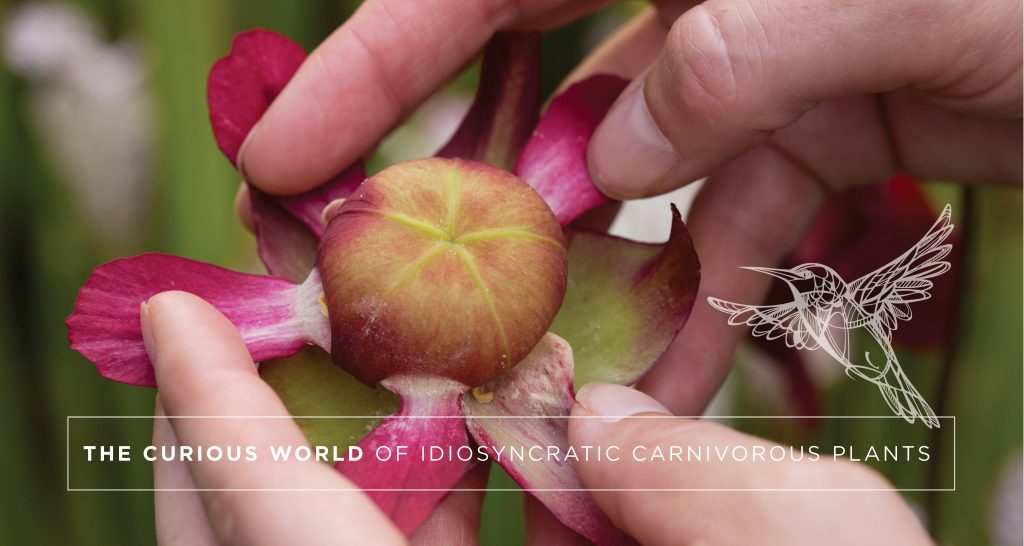
“What I have found in my dissertation work is that these plants aren’t just catching any type of insect. Each species has particular traits that attract different types of prey from the environment. What I noticed while in the field is that the traps are also giving off fragrances that might also influence what prey they attract,” Stephens says. The grant enables her to improve what she is doing to extend to another trait; specifically, analyzing the smells the plants emit to attract specific prey. It also reveals a significant difference in perceptions.
“Charles Darwin was actually one of the first to propose that these plants exploit insect’s attraction to various fragrances. In addition to looking at the smells that the traps emit, I am testing a hypothesis that these plants somehow avoid capturing their pollinators in their quest to capture insects as prey either through chemical signals or other mechanisms. It’s really cool; this grant has exposed me to the field of chemical ecology. The way we perceive the world is very different than how insects perceive the world.”
Stephens explains how this has altered her scientific perspective.
“If you think about how plants and insects have evolved to communicate to each other through chemical signals it really changes your perception of the world. Plant smells can really convey a lot to an insect. It can communicate quality of rewards to pollinators and even attract very specific plant pollinators to visit.”
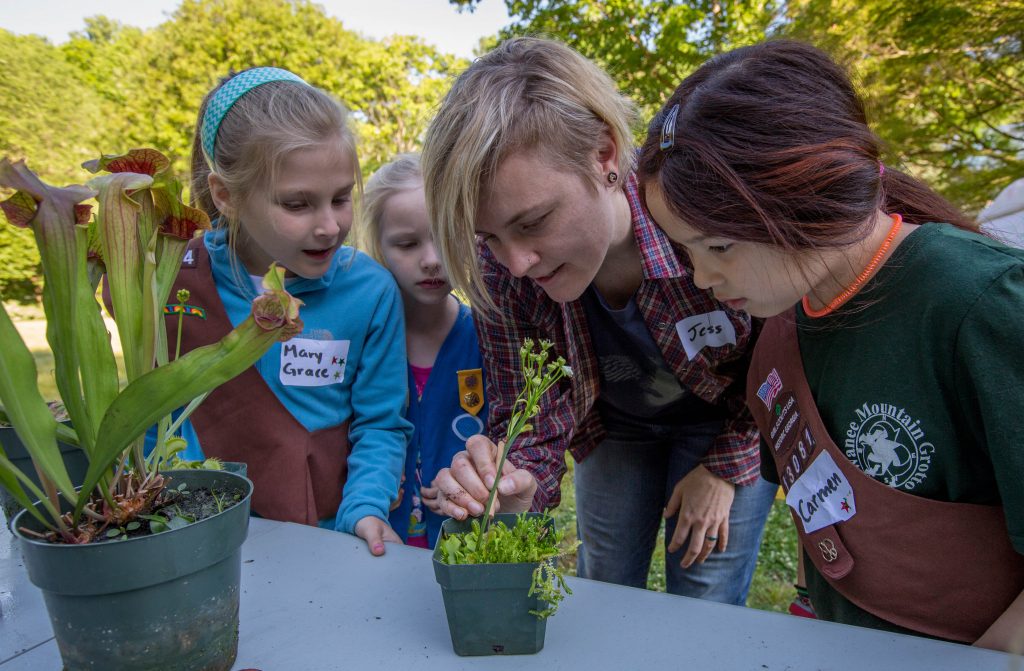
Stephens volunteered with a Girl Scout Science event at the Georgia Botanical Gardens. The event, sponsored by the Graduate School last year, enabled graduate students to work with young scientists in the making. Stephens says it not only allowed for a “slew of badges” to be earned, but for the girls to meet women scientists and perform experiments.
Stephens is collaborating with Andre Kessler and Robert Raguso, Cornell researchers and chemical ecologists, in order to analyze her collected samples.
In addition to plant-insect interactions, Stephens also does work on plant-microbe interactions. She is specifically interested in the microbe community that breaks down prey and whether that community changes with type of prey the pitcher plant eats or if the plant itself can somehow control that microbe community—similar to the human gut microbiome.
“Scientists are just starting to discover how important plant-microbe interactions can be for the health of a plant,” she says.
Her future will probably involve teaching as well as research, Stephens says. “I’ve had the opportunity to teach almost every semester I have been at UGA. I really love teaching and interacting with undergrads.”
She is so passionate about teaching that she has included it in her research.
“I’m currently doing a teaching research project with Dr. Peggy Brickman examining how graduate students use peer and faculty feedback to improve their pedagogical skills going forward. I am definitely interested in pursuing a career in academia, either through teaching or further work on plant- insect-microbe interactions or both!”
She is also reconnecting with being in the great outdoors—her avocation. “I’m finishing up here in Georgia and looking forward to the next adventure!”
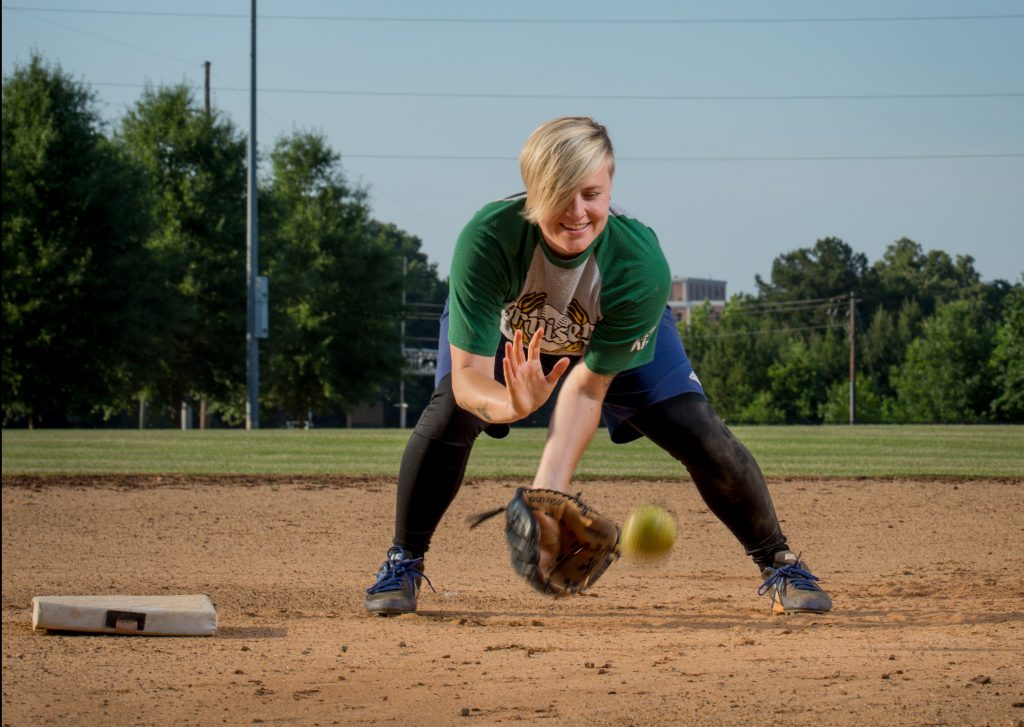
Stephens plays softball with the Little King Bruisers, a coed team in the Athens “bar league” sponsored by the Little Kings bar. The Little Bruisers have wound up their 2016 season and no matter how they finish up score-wise, she enjoyed the time spent with the team in wide-open spaces. Not even a calf muscle tear (she had to play much of the last season while wearing compression tights) could stop Stephens from the pleasure she derives in being a team player.
For Further Study
For more information on pitcher plant research: https://www.sciencedaily.com/terms/pitcher_plant.htm
For more information about carnivorous plants of the Southeast: http://www.nature.org/magazine/archives/killer-instincts-1.xml http://www.nature.org/newsfeatures/se20coastal20brochure2.pdf
For more information on the Atlanta Botanical Garden’s new Gainesville location: http://atlantabg.org/visit/gainesville
For more information on Jess Stephens’s research: http://sarracenia.uga.edu/dstephe/Home.html




